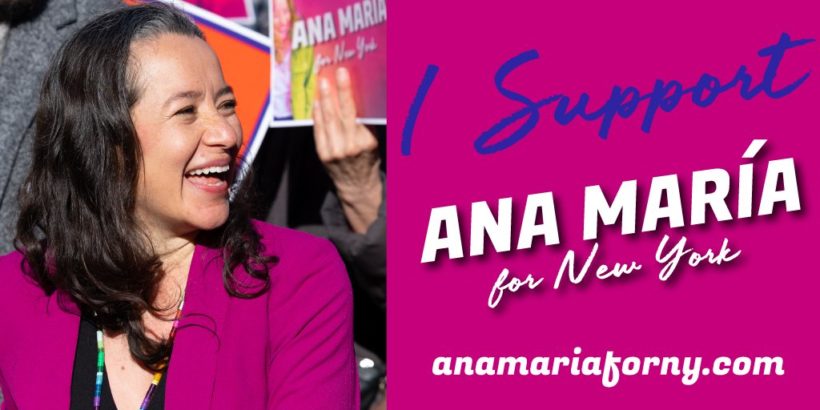I first heard about the Latin American Integration Center (LAIC) in 1998. I was a newcomer then, looking for a job, looking for English classes, looking for friends. And then I heard the name of the director of LAIC: Sara Maria Archila. Over the years, I learned that LAIC became the now well-known organization, Make the Road. For some time, I thought that Sara Maria Archila and Ana Maria Archila were the same person. It was not only the resemblance in their names but also their work for social causes. I brought friends to Make the Road to take their classes for the citizenship test, and I presented myself as an attorney to speak about political asylum petitions. And Make the Road’s work wasn’t just about teaching; it was also about supporting campaigns such as higher wages for workers, universal health insurance, better living conditions in general, and many others. And I kept hearing Ana Maria Archila’s name.
By Jhon Sánchez
I only found out that Ana Maria and Sara Maria were two different people when I met Ana Maria’s father and Sara’s brother, Arturo. That was five years ago. Sara Maria, the aunt, had died, and Ana Maria, her niece, had taken the leadership of LAIC and then founded Make the Road and became the executive director of the Center for Popular Democracy.
Last Friday, Arturo invited some friends to talk about Ana Maria’s campaign for vice-governor. “I have invited you because I want your support for Ana Maria as you are like family,” Arturo said, and I felt very honored. “Sara Maria had you in her arms when you were little, and Ana Maria spent her vacations at your house,” he was referring to the Chaves O’Flynn sisters. They had come along with their husbands, the poet Carlos Aguasaco, and the owner of Terraza 7, also a well-known activist, Freddy Castiblanco. They mentioned the mother of the Chaves O’Flynn sisters, of whom I had never heard, “Carol, an activist, participated in the civil rights movement, was with Martin Luther King in Selma and went to Colombia where she also worked for human rights. She has a life worthy of a documentary,” Freddy Castiblanco explained to me.
And at that moment, I realized that Ana Maria’s candidacy was not only the product of her work for the communities but the result of a formation within a migrant, Colombian family with a tradition in politics, culture, and human rights.
Ana Maria represents in her person many of us, a middle-class person with two children, a migrant who arrived at the age of seventeen, an openly bisexual woman, a woman who revealed to the world that she was a sexual assault survivor in her confrontation with Senator Jeff Flake during Brett Kavanaugh’s confirmation hearings for the Supreme Court. Not everyone indeed fulfills all those characteristics. Still, we can see courage in her and ourselves, a crucial quality for being parents, immigrants, workers, demanding citizens, and being a Lieutenant Governor. Courage. And she has plenty of it.
Now that I can tell her apart, I am interested in Ana Maria’s way of doing politics. She told us in her moving speech at La Nacional last Monday that she wanted to become Lieutenant governor, “because it was in New York where I saw the power that is unleashed when people come together to hear about their struggles, about their difficulties and to join forces to change their circumstances.” The above sentence denotes a way of doing politics that has two parts: one of listening to each other and the second part of uniting for change.
We know the task is not easy. We have to collect tens of thousands of signatures, recruit volunteers, raise funds that cannot be compared to the ones being raised by the millionaires with whom she has to compete; however, we must be aware of as Ana Maria says, “If we manage to change our governors, we manage to change the imbalance that people live between their dreams and their difficulties.”
For more information about Ana María Archila, please visit https://www.anamariaforny.com










